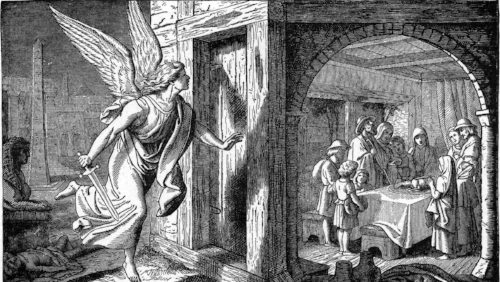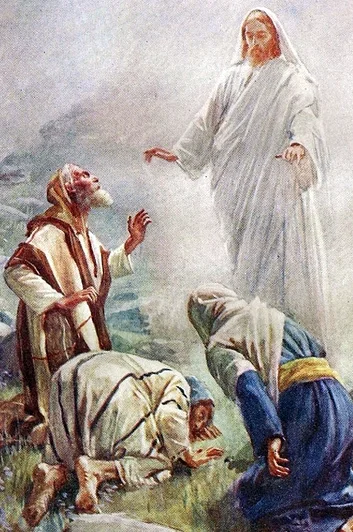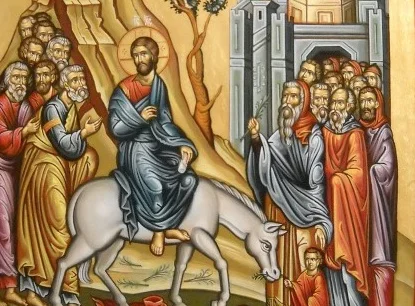Vegetable love being better than hate-filled steak (Proverbs 15:17)
Jonathan's David-love. (2 Samuel 1:26)
Jesus was an Immigrant, a Refugee
Fleeing oppression and likely death, the holy family crossed international boarders without papers. They took whatever they could carry, what little resources they had, and fled. Joseph trusted that God would provide for his family: a Brown day laborer with carpentry skills, a young, frightened wife, and their precociously wide-eyed child.
Wide and Narrow Gates (Matthew 7:13-14) [Guest Card Talk]
"When I read this card I hear a guideline and see a lens through which to evaluate what I’m doing with my life, in a broad, whole picture view, or within a given, specific situation. It helps me make better decisions, informed by my choice to adhere to Jesus’ teachings to the best of my ability. I don’t do this out of a fear of Hell or destruction, but out of love for life – others’ as well as my own.
Refugees: "not a Bible issue"? OR Why Franklin Graham can go [expletives deleted]...
Playing the whore with many lovers on top of every high hill and under every green tree (Jeremiah 2:20)
We had a long post planned for this one: a carefully articulated, poetically worded, Scripture laden treatise to prove a central point; but allow us state it crassly, boldly: Take your complaints about patriarchal language and shove them for a moment and realize that God loves you, loves us, love the Jews of Jeremiah's day, and was hurt by their actions against Him, our actions again Him, your actions. Mine.
Jeremiah paints God as a hurt lover, like Hosea, Isaiah, and Ezekiel did before him. That is the heart of the text.
Have you ever been cheated on? Have you had someone you cared for rip your heart out, when all you ever did was love them as best you could? Have you ever asked them "why" and got a shrug in return? Have you desired to take them back when you know the outcome will leave you in tears again?
There were so many things we were going to say, rephrasing, rehashing, recapturing the anguish Jeremiah and the other prophets cull from the heart of God, but instead we give you these words from Martin Sexton's "Where Did I Go Wrong?" [Maybe read them alongside the second chapter of Jeremiah in itself entirety, where God laments a lost love, saying "you were My lovely bride, you used to love Me? What happened? I gave you everything, but you left Me for another who treats you horribly. Why?"]
Where did I go wrong with you?
Where did I go wrong?
Was it something I said or did or didn't do?
Was all I had not enough for you?
All the life we were burning through
What with your memory shall I do?
I opened up the deepest of my inside
It was all I had left to give to you.
Where did I go wrong with you?
Perhaps ... no. No perhaps. God loves us and we act like unfaithful spouses.
And you probably think we're going to Hell for making this game, but you know we're right.
Ezekiel: Dysfunction You Can Trust (?)
We have multiple cards based in the book of Ezekiel, including "Bread Freshly Baked with Human Dung (4:12)," "Turning Fine Gold and Silver Jewelry into Gilded Dildos (16:17)," and of course "Lusting After Lovers with Donkey Genitals and Horse Emission (23:20)" [We've gotten multiple emails asking for assurances that the latter was included in the game].
One of our Ezekiel cards garners more silence than laughter when played by some brave soul: "God-sanctioned Gang Rape. (Ezekiel chapter 23)"
Go read the chapter. Then take a walk. Hug a puppy. Kiss your children. Practice watercolors. And then come back. We'll be here to talk when you're done.
We are not equipped to psychoanalyze the prophet Ezekiel, certainly not in a more thoughtful manner than the countless biblical scholars and psychologists who have gone before. The metaphors, images, and symbols employed by this prophetic voice offend the senses of most readers to the point of utter confusion and revulsion. This has led to lay and learned speculation about Ezekiel's relationship with the significant female figures in his upbringing and later life, an absentee father figure (God notwithstanding), the use of hallucinogens, alien-abductions, and attributing to him various mental maladies, including manic-depression, an anti-social personality disorder, and/or pathological aggression towards women.
Any, one, or none of these may be the case, but what would it matter? As one author/speaker elegantly penned, "God Uses Cracked Pots:" We're all broken. It's through those fissures that the living water flows through us and waters a thirsty ground. Or something like that. Something a lot less violent, disturbing, and unbearable compared to the gore laced spectacles with which Ezekiel confronts the people of Israel.
Or is that the point?
Hebrew Bible/Old Testament scholar Dr. Leslie C. Allen presented a perspective on Ezekiel's personal dilemma that is haunting: "It took language this outrageous to break the spell of the Temple."
Imagine talking to a people so convinced of their moral and social superiority, despite acts of oppressive avarice against those in poverty; a people who believe they are immune to God's punishment because they are His favorite nation — He has placed His house, His Ark, His Law, in His city, among His people; a people you love and desire to rescue from their impending doom, but God has already told you that this is impossible, they will not listen to you: What do you do? How do you get through to them?
By any means necessary. Through offense. Scandal. Shock and awe. Anything to prevent a valley of dried bones.
Perhaps the words of Abraham J. Heschel on prophetic speech corresponds with Dr. Allen's thought: "[the prophet's] images must not shine, they must burn."
Perhaps a prophet's occupational hazard has a corresponding benefit compared to the pastor/priest:
The prophet often screams from outside the congregation: warning, chiding, loving, from afar. This is so unlike the pastor/priest embedded in the congregation — and the social cliques, and the church board, and hierarchical structures of review — who weekly worries about which words might give offense, what edification will not be received well. Illustrations must be pruned, and picked and ripened so very, very carefully.
The prophet's only concern is that the orchard is on fire.
Perhaps a little Ezekiel is still needed in the world.
But what do we know: we made this game and you probably think we're going to hell anyway.



![O Come, O Come Emmanuel (Isaiah 7:14) [An Advent Card Talk]](https://images.squarespace-cdn.com/content/v1/55a9a1e3e4b069b20edab1b0/1483161046976-X5VJE3CMP9T957O72EII/3d-wallpapers-light-dark-wallpaper-35822.jpg)





![Wide and Narrow Gates (Matthew 7:13-14) [Guest Card Talk]](https://images.squarespace-cdn.com/content/v1/55a9a1e3e4b069b20edab1b0/1494213447072-GP9Q801E9JLH3V1OM731/image58.jpg)
![Refugees: "not a Bible issue"? OR Why Franklin Graham can go [expletives deleted]...](https://images.squarespace-cdn.com/content/v1/55a9a1e3e4b069b20edab1b0/1485663569387-MZS8YSZFDLEYWQQ6XS48/a-girl-injured-in-aleppo-6-5-2014.jpg)

Perhaps we should remember the women in the room when Ezekiel first uttered these words. They had been forcibly marched from their homes. They had watched their families die. Some had been raped by the Babylonians. How did they feel? Perhaps we should remember the women who read these texts today, the women in our churches and homes, whose current situations are not too dissimilar to the women in exile by the rivers of Babylon. They have enough reasons to weep.